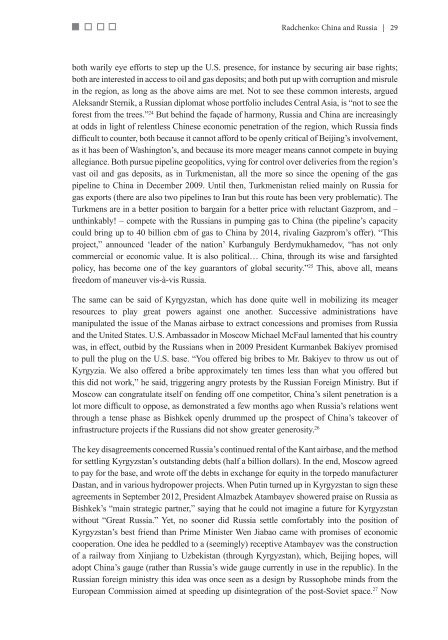the full publication PDF - Korea Economic Institute
the full publication PDF - Korea Economic Institute
the full publication PDF - Korea Economic Institute
Create successful ePaper yourself
Turn your PDF publications into a flip-book with our unique Google optimized e-Paper software.
Radchenko: China and Russia | 29<br />
both warily eye efforts to step up <strong>the</strong> U.S. presence, for instance by securing air base rights;<br />
both are interested in access to oil and gas deposits; and both put up with corruption and misrule<br />
in <strong>the</strong> region, as long as <strong>the</strong> above aims are met. Not to see <strong>the</strong>se common interests, argued<br />
Aleksandr Sternik, a Russian diplomat whose portfolio includes Central Asia, is “not to see <strong>the</strong><br />
forest from <strong>the</strong> trees.” 24 But behind <strong>the</strong> façade of harmony, Russia and China are increasingly<br />
at odds in light of relentless Chinese economic penetration of <strong>the</strong> region, which Russia finds<br />
difficult to counter, both because it cannot afford to be openly critical of Beijing’s involvement,<br />
as it has been of Washington’s, and because its more meager means cannot compete in buying<br />
allegiance. Both pursue pipeline geopolitics, vying for control over deliveries from <strong>the</strong> region’s<br />
vast oil and gas deposits, as in Turkmenistan, all <strong>the</strong> more so since <strong>the</strong> opening of <strong>the</strong> gas<br />
pipeline to China in December 2009. Until <strong>the</strong>n, Turkmenistan relied mainly on Russia for<br />
gas exports (<strong>the</strong>re are also two pipelines to Iran but this route has been very problematic). The<br />
Turkmens are in a better position to bargain for a better price with reluctant Gazprom, and –<br />
unthinkably! – compete with <strong>the</strong> Russians in pumping gas to China (<strong>the</strong> pipeline’s capacity<br />
could bring up to 40 billion cbm of gas to China by 2014, rivaling Gazprom’s offer). “This<br />
project,” announced ‘leader of <strong>the</strong> nation’ Kurbanguly Berdymukhamedov, “has not only<br />
commercial or economic value. It is also political… China, through its wise and farsighted<br />
policy, has become one of <strong>the</strong> key guarantors of global security.” 25 This, above all, means<br />
freedom of maneuver vis-à-vis Russia.<br />
The same can be said of Kyrgyzstan, which has done quite well in mobilizing its meager<br />
resources to play great powers against one ano<strong>the</strong>r. Successive administrations have<br />
manipulated <strong>the</strong> issue of <strong>the</strong> Manas airbase to extract concessions and promises from Russia<br />
and <strong>the</strong> United States. U.S. Ambassador in Moscow Michael McFaul lamented that his country<br />
was, in effect, outbid by <strong>the</strong> Russians when in 2009 President Kurmanbek Bakiyev promised<br />
to pull <strong>the</strong> plug on <strong>the</strong> U.S. base. “You offered big bribes to Mr. Bakiyev to throw us out of<br />
Kyrgyzia. We also offered a bribe approximately ten times less than what you offered but<br />
this did not work,” he said, triggering angry protests by <strong>the</strong> Russian Foreign Ministry. But if<br />
Moscow can congratulate itself on fending off one competitor, China’s silent penetration is a<br />
lot more difficult to oppose, as demonstrated a few months ago when Russia’s relations went<br />
through a tense phase as Bishkek openly drummed up <strong>the</strong> prospect of China’s takeover of<br />
infrastructure projects if <strong>the</strong> Russians did not show greater generosity. 26<br />
The key disagreements concerned Russia’s continued rental of <strong>the</strong> Kant airbase, and <strong>the</strong> method<br />
for settling Kyrgyzstan’s outstanding debts (half a billion dollars). In <strong>the</strong> end, Moscow agreed<br />
to pay for <strong>the</strong> base, and wrote off <strong>the</strong> debts in exchange for equity in <strong>the</strong> torpedo manufacturer<br />
Dastan, and in various hydropower projects. When Putin turned up in Kyrgyzstan to sign <strong>the</strong>se<br />
agreements in September 2012, President Almazbek Atambayev showered praise on Russia as<br />
Bishkek’s “main strategic partner,” saying that he could not imagine a future for Kyrgyzstan<br />
without “Great Russia.” Yet, no sooner did Russia settle comfortably into <strong>the</strong> position of<br />
Kyrgyzstan’s best friend than Prime Minister Wen Jiabao came with promises of economic<br />
cooperation. One idea he peddled to a (seemingly) receptive Atambayev was <strong>the</strong> construction<br />
of a railway from Xinjiang to Uzbekistan (through Kyrgyzstan), which, Beijing hopes, will<br />
adopt China’s gauge (ra<strong>the</strong>r than Russia’s wide gauge currently in use in <strong>the</strong> republic). In <strong>the</strong><br />
Russian foreign ministry this idea was once seen as a design by Russophobe minds from <strong>the</strong><br />
European Commission aimed at speeding up disintegration of <strong>the</strong> post-Soviet space. 27 Now










